
 updated: 3 January 2020
updated: 3 January 2020
My interests in sports governance dates back more than 25 years to the time that I worked as a “mentor/tutor” in the University of Colorado Boulder athletics department.
More recently, I started using cases of sports governance controversies in teaching, based on a need to find interesting and unique cases of science and technology in decision making. In 2009 I began to use “sex testing” and the case of Oscar Pistorius in my grad seminar on science in society. Students found these topics fascinating, and it help motivated me to further pursue the role of science in sport.
I jumped into the deep end of the pool in 2011 when I started a blog, The Least Thing, which I maintained on a near-daily basis for more than seven years. I spent the summer of 2011 studying FIFA, trying to understand how it could both be so messed up and so unfixable. The result was a major paper (Pielke 2013, linked below) which came out right in the midst of the scandal which engulfed the organization.
In 2011, I made my way to Cologne, Germany for the biennial Play the Game conference. This, perhaps more than anything, motivated a change in direction for my career. Even in 2011, participation in climate change research and policy was both less interesting and less fun. The PTG folks were my people and I was happy to find them. I have been an active participant ever since and am proud to have played a small role in helping to bring the 2019 conference to Colorado.
In 2012 I initiated efforts to create a new “sports governance center” at the University of Colorado Boulder. The major innovation we pursued was to locate this academic unit inside the university’s big-time athletics department. This took some doing, but in 2016 the SGC had been established. I was, to the best of my knowledge, the only tenured, full professor in the US who is rostered in a NCAA Division 1 athletics program.
Unfortunately, after a great start the University of Colorado Boulder terminated our effort. Even so, we had great success.
In 2014, I volunteered to teach a new course above load on sports governance. The CU Ethnic Studies program agreed, graciously, to host the class, Introduction to Sports Governance, which had 12 students that first year. In 2019, the class had 160 students (clasroom capacity)and a waitlist, with a fantastic line up of speakers and topics. CU Athletics and CU Ethnic Studies have been fantastic is supporting the development of this class, which is a massive success (and also time consuming but incredibly rewarding).
My research and blogging informed my 2016 book, The Edge, which is about the battlegrounds where the future of sport is being waged: college sports, doping, technology, gender and more. Check it out here. This book was a joy to write. I learned so much.
I’ve now written a lot of commentaries and academic papers on sports governance topics. My current areas of interest include:
- the use and misuse of science in anti-doping regulation;
- sex and gender in sport;
- reform of college athletics;
- governance (and corruption) in national and international sports bodies;
- the regulation of technology in sport.
Here is a selection of academic papers:
Pielke Jr, R. 2013. How can FIFA be held accountable?. Sport management review, 16:255-267.
Pielke Jr, R. 2015. Gather data to reveal true extent of doping in sport. Nature, 517:529.
Pielke Jr, R. 2016. Obstacles to accountability in international sports governance. Transparency International, global corruptions report: Soccer. (PDF)
Pielke Jr, R. 2017. Sugar, spice and everything nice: how to end ‘sex testing’in international athletics. International Journal of Sport Policy and Politics, 9:649-665.
Pielke, R. 2018. Assessing doping prevalence is possible. So what are we waiting for?. Sports Medicine, 48:207-209.
Pielke, R., Tucker, R., & Boye, E. 2019. Scientific integrity and the IAAF testosterone regulations. The International Sports Law Journal, 1-9.
Pielke, Jr., R. 2019. Caster Semenya ruling: sports federation is flouting ethics rules, Nature, doi: 10.1038/d41586-019-01606-8
Pielke, Jr., R. and E. Boye, 2019. Scientific Integrity and Anti-Doping Regulation, International Journal of Sport Policy and Politics. (summary, a Twitter thread, email for a PDF of the published version).
Pielke, Jr. R., R. Tucker and E. Boye, 2019. Scientific Integrity and the IAAF Testosterone Regulations, International Sports Law Journal. (open access, correction of labeling errors here)
Pielke, Jr., R. 2019. Here’s How to Compensate College Athletes, New York Times, 30 October.
Pielke, Jr., R. 2019. On Super Bowl weekend, it’s worth considering whether male-focused sports are out of step, USA Today, 3 February.
I’ll continue to update this page.
[…] die Berichterstattung zu den Olympischen Spielen in Rio. Das ist mehr als nur ein Zufall, zumal Pielkes Buch erst Mitte September 2016 erscheinen […]
LikeLiked by 1 person
[…] Während ich an meinem Schreibtisch sitze und diese Rezension schreibe, läuft im Hintergrund die Berichterstattung zu den Olympischen Spielen in Rio. Das ist mehr als nur ein Zufall, zumal Pielkes Buch erst Mitte September 2016 erscheinen wird. […]
LikeLiked by 1 person
My husband was just given a 4 year ban in his sport for taking a supplement that was not on the ban list. He went through arbitration and that was his sanction. In the summary of his case the arbitrators say “we unanimously believe you are not a cheater, but we are tied by the law”. This was his first offense and they gave him the maximum ban time. Who could I reach to for help and guidance in going for an appeal process. He is a struggling athlete that took protein as a meal because he could not afford anything else and for this substance he is now banned. Please, We need help.
LikeLiked by 1 person